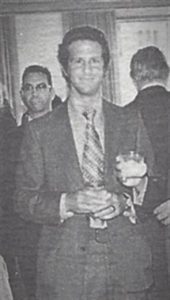What I’ve Learned: Doug Herst
Posted 10/23/2017Doug Herst – Founder & Executive Chairman of Lumenetix, Past Chairman & CEO of Peerless Lighting Inc.
Set a goal or vision. My grandfather had creativity fueled by his sense that good would overcome any difficulties he might encounter. He told stories about a teenager named Peter and his friends, and whenever they were in difficult circumstances, Peter would rub his magic box and they would all emerge unscathed. But if you’re going to rub the magic box, what is it you want to accomplish? I wasn’t the smartest or strongest kid, but I realized that if I studied and worked consistently, I could make the grade. Set your intentions, and then materialize your vision.
The notion of being an optimist is a blessing. Optimism lets you look for opportunities that can make a difference. You look at a problem and come up with ideas to solve it. It thrusts you through the questions into curiosity, and once you understand the problem you look for the next step of materializing a solution.
A team is best when balanced. Dr. Ichak Adizes described a model for teamwork with four characteristics of a team [the PAEI model]; he believed a good marriage includes these four characteristics. My wife is the ‘people person’ in our family, and she has been my most powerful human relations coach. Her empathy has always been very powerful—we complement one another. You can employ that same process of balance in business teams, too.
Understand who you are—your strengths and weaknesses. Trust in yourself to understand what really motivates you, excites you—what fuels your passion! I spent three months traveling through Europe when I was 20! We were sent to visit different museums, and I didn’t get it until I was in Paris watching [Van Gogh’s famous painting] ‘Starry Night’. I stood there for hours just looking at that painting, and then I came back and enrolled in every art class I could.That passion led me to work at Peerless making new designs. The most important thing to me was the beauty of the objects themselves, which fueled my work.
Success requires both innovation and logic. My grandfather approached innovation with a positive demeanor and a risk-taking attitude. My father, Sam, was risk-averse and employed logic. Both are necessary, as any risky undertaking of value must be fueled by optimism as well as be conservatively planned.
At the end of the day, only close family and friends really matter. My wife and I were blessed with two beautiful sons and a daughter, but tragically lost one son—Scott—along the way. At a time of real, profound grief, you learn the importance of unconditional love and how to deal with profound tragedy. Family and friends are so important in life, and it becomes very prominent at a time of tragedy.
Think about how you want to be remembered. I remember attending a seminar and being asked this question. For me, I saw business as a balance with what I call ‘a great place to work’ on one side and growth and profitability on the other side. I also worked with a psychologist to understand myself and set a vision to ensure that I would be very clear on what I valued, which for me was people, integrity and innovation.




